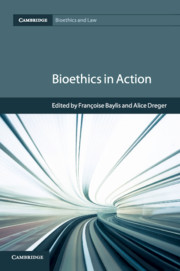Book contents
- Bioethics in Action
- Cambridge Bioethics and Law
- Bioethics in Action
- Copyright page
- Contents
- Contributors
- Acknowledgments
- 1 More than Words
- 2 “Where There’s Smoke, There’s Pfizer”
- 3 “So What?”
- 4 Twenty Years of Working toward Intersex Rights
- 5 Working with Public Citizen
- 6 Reproductive Technology’s Legacy of Omission
- 7 Establishing Pediatric Palliative Care
- 8 History and Philosophy of Science Engaging the Public
- 9 The Flint Water Crisis
- Index
- Series page
3 - “So What?”
Historical Contingency, Activism, and Reflections on the Studies in Tuskegee and Guatemala
Published online by Cambridge University Press: 11 May 2018
- Bioethics in Action
- Cambridge Bioethics and Law
- Bioethics in Action
- Copyright page
- Contents
- Contributors
- Acknowledgments
- 1 More than Words
- 2 “Where There’s Smoke, There’s Pfizer”
- 3 “So What?”
- 4 Twenty Years of Working toward Intersex Rights
- 5 Working with Public Citizen
- 6 Reproductive Technology’s Legacy of Omission
- 7 Establishing Pediatric Palliative Care
- 8 History and Philosophy of Science Engaging the Public
- 9 The Flint Water Crisis
- Index
- Series page
Summary
- Type
- Chapter
- Information
- Bioethics in Action , pp. 32 - 54Publisher: Cambridge University PressPrint publication year: 2018
- 1
- Cited by



